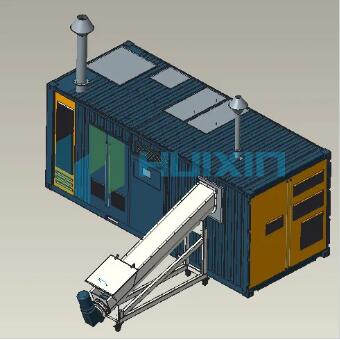Understanding Complete Sets of Equipment for Domestic Garbage Mobile Incinerators
2024-09-10
The increasing volume of domestic waste has made waste management a critical issue for urban and rural areas alike. One innovative solution that has emerged is the mobile incinerator for domestic garbage, which offers a flexible and efficient way to handle waste in remote or urban areas. In this blog, we’ll explore the essential features of complete sets of equipment for domestic garbage mobile incinerators, as well as their benefits and potential applications.
What is a Mobile Garbage Incinerator?
A mobile garbage incinerator is a portable waste treatment system designed to burn or thermally treat domestic waste. These incinerators are mounted on trailers or vehicles, making them highly mobile and ideal for handling waste in multiple locations. They offer a practical solution for regions without easy access to large-scale waste processing plants.
Key Components of a Mobile Incinerator System
A complete set of equipment for domestic garbage mobile incinerators typically includes the following components:
1. Incineration Chamber: The primary section where waste combustion takes place. The chamber is designed to withstand high temperatures and efficiently burn a wide range of waste materials, such as plastics, paper, organic waste, and more.
2. Flue Gas Treatment System: This system is essential for controlling and minimizing the release of harmful gases during the incineration process. Filters, scrubbers, or catalytic converters are used to capture particulate matter and neutralize toxic gases like dioxins and sulfur dioxide.
3. Waste Feeder: An automated or manual feeder system that introduces domestic waste into the incineration chamber. This feature ensures a consistent and controlled feeding process, which improves efficiency and reduces emissions.
4. Control System: The control system allows operators to monitor and adjust the incineration process in real-time. Parameters such as temperature, combustion time, and emissions are tracked to ensure safe and efficient operation.
5. Ash Collection System: After combustion, a certain amount of ash remains, which must be collected and disposed of. An efficient ash collection system ensures easy removal and minimizes the risk of environmental contamination.
6. Exhaust Stack: The exhaust stack channels gases produced during combustion through the flue gas treatment system before releasing them into the atmosphere. Proper design is essential to ensure emissions are within regulatory limits.
Benefits of Mobile Incinerators for Domestic Garbage
1. Portability: One of the most significant advantages of a mobile garbage incinerator is its mobility. It can be transported to different locations where waste generation is high, such as remote towns, temporary camps, or festivals, making it a versatile solution.
2. On-site Waste Treatment: The mobile incinerator enables the immediate treatment of waste on-site, reducing the need to transport waste to distant landfill sites or processing plants, which can be costly and time-consuming.
3. Reduces Landfill Dependency: Incinerating waste significantly reduces the volume of waste, which in turn decreases the burden on landfills. This is particularly valuable in regions where landfill space is limited.
4. Energy Recovery: Some incinerators are equipped with energy recovery systems that capture heat from the incineration process and convert it into energy. This energy can be used to power the system itself or even provide electricity to nearby areas.
5. Environmental Protection: Advanced flue gas treatment systems ensure that harmful emissions are minimized, making mobile incinerators a more environmentally friendly option compared to traditional open burning or unregulated disposal methods.
Applications of Mobile Garbage Incinerators
- Remote Communities: In regions that are far from centralized waste management facilities, mobile incinerators provide an efficient solution to manage waste locally.
- Disaster Relief Areas: After natural disasters, large amounts of debris and waste accumulate. Mobile incinerators help clean up and manage this waste quickly, reducing the risk of disease and environmental damage.
- Construction Sites: Mobile incinerators can help construction companies manage the waste generated on-site, particularly in remote or temporary work areas.
- Festivals and Events: Large gatherings generate significant amounts of waste. Mobile incinerators can manage waste in real time, preventing the need for extensive post-event cleanup.
Conclusion
Complete sets of equipment for domestic garbage mobile incinerators provide a flexible, efficient, and environmentally friendly solution for waste management in a variety of settings. From reducing landfill use to managing waste in remote areas, mobile incinerators offer a practical alternative for on-site waste treatment, improving both environmental and public health outcomes.



